【精品】英语情景交际用法总结(完整)
- 格式:doc
- 大小:71.00 KB
- 文档页数:10
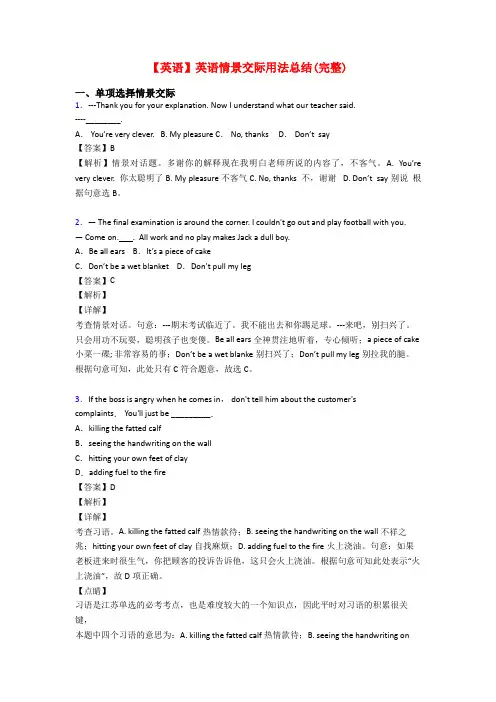
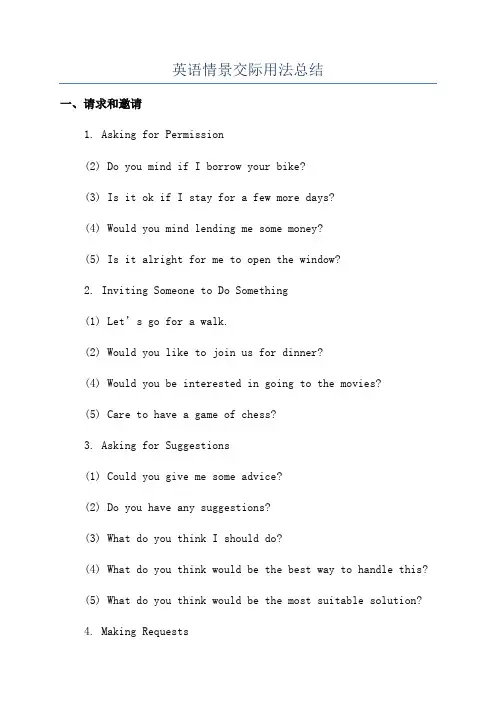
英语情景交际用法总结一、请求和邀请1. Asking for Permission(2) Do you mind if I borrow your bike?(3) Is it ok if I stay for a few more days?(4) Would you mind lending me some money?(5) Is it alright for me to open the window?2. Inviting Someone to Do Something(1) Let’s go for a walk.(2) Would you like to join us for dinner?(4) Would you be interested in going to the movies?(5) Care to have a game of chess?3. Asking for Suggestions(1) Could you give me some advice?(2) Do you have any suggestions?(3) What do you think I should do?(4) What do you think would be the best way to handle this?(5) What do you think would be the most suitable solution?4. Making Requests(1) Can you help me with my homework?(2) Could you please pass me the salt?(3) Could you do me a favor?(4) Would you mind giving me a hand?(5) Can you take a look at this for me?二、表示拒绝1. Polite Refusal(1) I’m sorry, but I can’t.(2) No, I’m afraid not.(3) I’m afraid it’s not convenient for me.(4) I’m sorry, I have other plans.(5) That’s very kind of you, but I can manage.2. Firm Refusal(1) I’m sorry, I won’t be able to do that.(2) No, I can’t do that.(3) I’m sorry, I won’t be able to take up your offer.(4) No, I’m afraid that’s out of the question.(5) I’m sorry, I have to refuse.三、表达感谢1. Expressing Gratitude(1) Thanks a lot.(2) I really appreciate it.(3) Thank you for your help.(4) Thanks for your kind assistance.(5) I’m very grateful for your hospitality.2. Accepting Thanks(2) It’s my pleasure.(3) Don’t mention it.(4) It’s nothing.(5) Glad to be of help.四、表达道歉1. Apologizing(1) I’m sorry about the mistake.(2) Please forgive me for my carelessness.(3) I apologize for my behavior.(4) I apologize for not being able to attend.(5) I apologize for any inconvenience caused.2. Accepting Apology(1) That’s alright.(2) Don’t worry about it.(3) It’s ok.(4) Don’t mention it.(5) That’s quite all right.五、表达鼓励1. Encouraging Someone(1) You can do it.(2) Hang in there.(3) You’re doing great.(4) I believe in you.(5) Keep it up.2. Accepting Encouragement(1) Thank you.(2) I really appreciate it.(3) That means a lot to me.(4) I’m glad to have your support.(5) You’ve given me the courage to go on.六、表达肯定1. Expressing Agreement (1) That’s a great idea.。
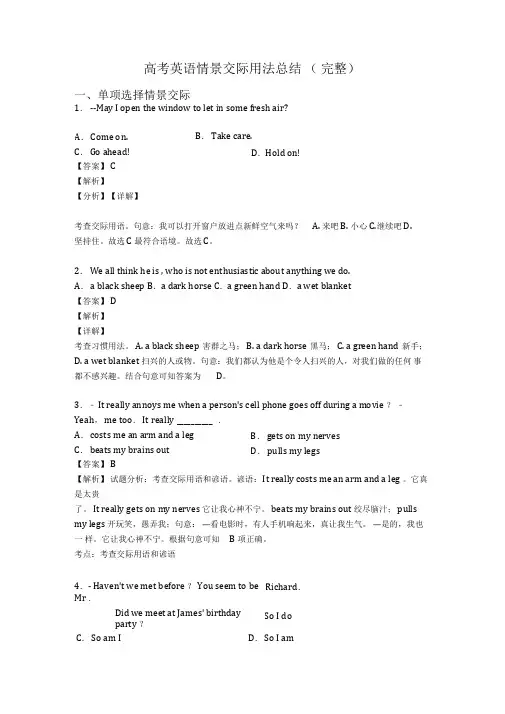
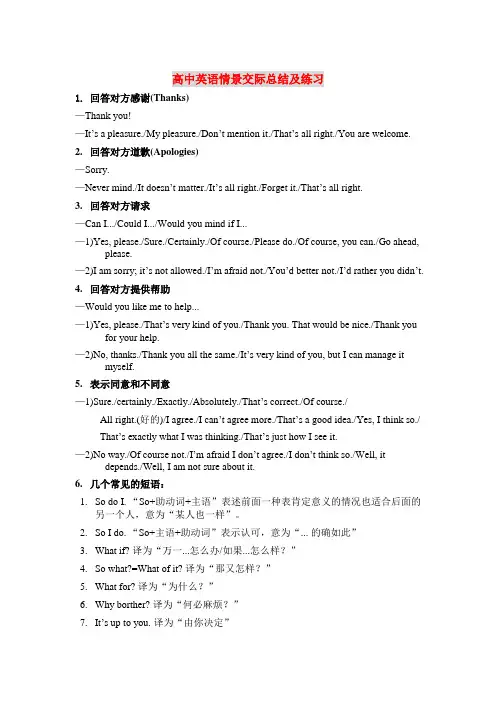
高中英语情景交际总结及练习1.回答对方感谢(Thanks)—Thank you!—It’s a pleasure./My pleasure./Don’t mention it./That’s all right./You are welcome. 2.回答对方道歉(Apologies)—Sorry.—Never mind./It doesn’t matter./It’s all right./Forget it./That’s all right.3.回答对方请求—Can I.../Could I.../Would you mind if I...—1)Yes, please./Sure./Certainly./Of course./Please do./Of course, you can./Go ahead, please.—2)I am sorry; it’s not allowed./I’m afraid not./You’d better not./I’d rather you didn’t.4.回答对方提供帮助—Would you like me to help...—1)Yes, please./That’s very kind of you./Thank you. That would be nice./Thank you for your help.—2)No, thanks./Thank you all the same./It’s very kind of you, but I can manage it myself.5.表示同意和不同意—1)Sure./certainly./Exactly./Absolutely./That’s correct./Of course./All right.(好的)/I agree./I can’t agree more./That’s a good idea./Yes, I think so./ That’s exactly what I was thinking./That’s just how I see it.—2)No way./Of course not./I’m afraid I don’t agree./I don’t think so./Well, it depends./Well, I am not sure about it.6.几个常见的短语:1.So do I. “So+助动词+主语”表述前面一种表肯定意义的情况也适合后面的另一个人,意为“某人也一样”。
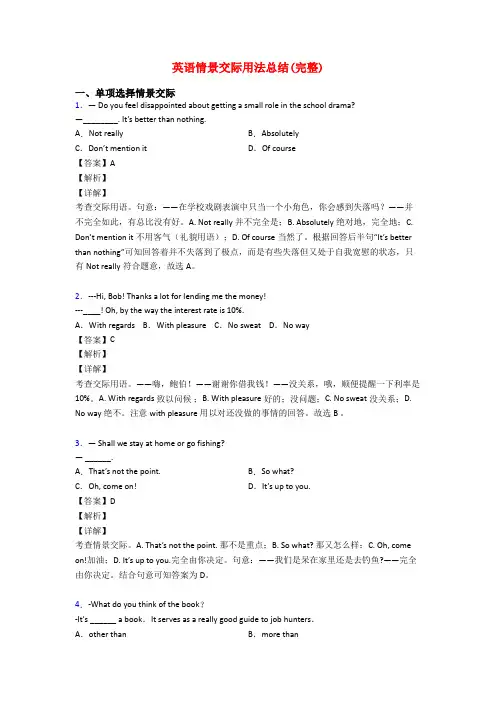
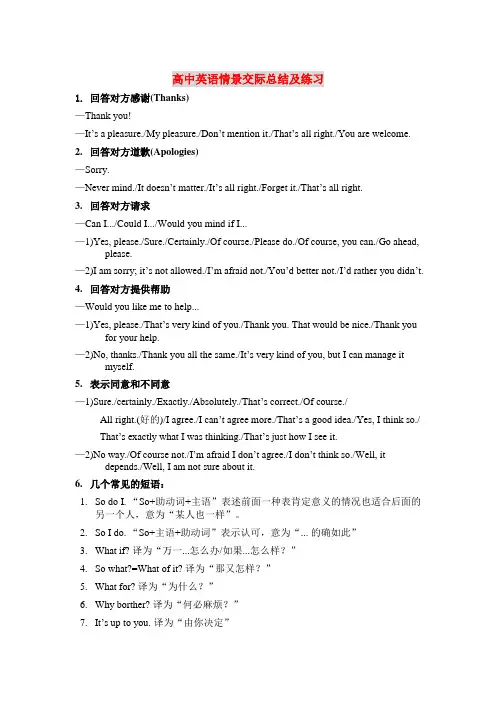
高中英语情景交际总结及练习1.回答对方感谢(Thanks)—Thank you!—It’s a pleasure./My pleasure./Don’t mention it./That’s all right./You are welcome. 2.回答对方道歉(Apologies)—Sorry.—Never mind./It doesn’t matter./It’s all right./Forget it./That’s all right.3.回答对方请求—Can I.../Could I.../Would you mind if I...—1)Yes, please./Sure./Certainly./Of course./Please do./Of course, you can./Go ahead, please.—2)I am sorry; it’s not allowed./I’m afraid not./You’d better not./I’d rather you didn’t.4.回答对方提供帮助—Would you like me to help...—1)Yes, please./That’s very kind of you./Thank you. That would be nice./Thank you for your help.—2)No, thanks./Thank you all the same./It’s very kind of you, but I can manage it myself.5.表示同意和不同意—1)Sure./certainly./Exactly./Absolutely./That’s correct./Of course./All right.(好的)/I agree./I can’t agree more./That’s a good idea./Yes, I think so./ That’s exactly what I was thinking./That’s just how I see it.—2)No way./Of course not./I’m afraid I don’t agree./I don’t think so./Well, it depends./Well, I am not sure about it.6.几个常见的短语:1.So do I. “So+助动词+主语”表述前面一种表肯定意义的情况也适合后面的另一个人,意为“某人也一样”。
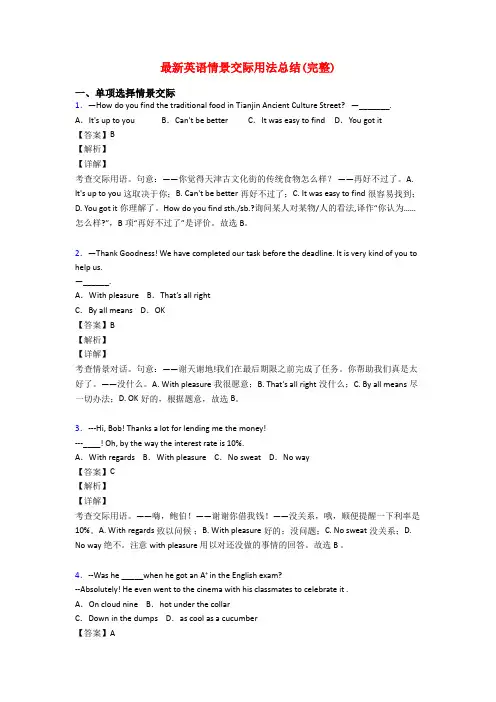
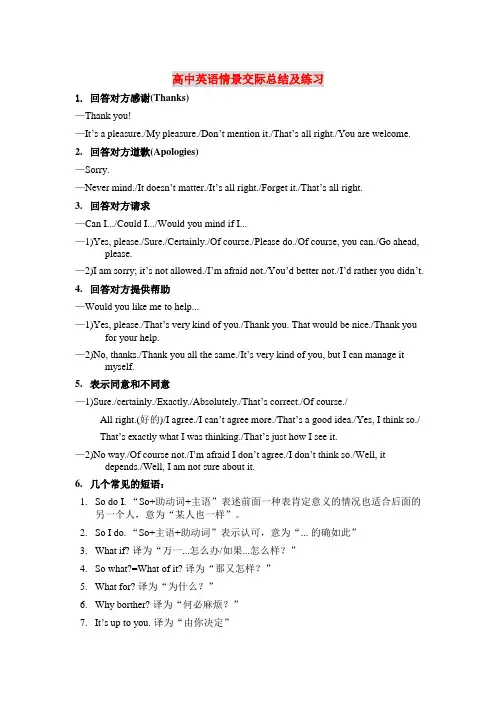
高中英语情景交际总结及练习1.回答对方感谢(Thanks)—Thank you!—It’s a pleasure./My pleasure./Don’t mention it./That’s all right./You are welcome. 2.回答对方道歉(Apologies)—Sorry.—Never mind./It doesn’t matter./It’s all right./Forget it./That’s all right.3.回答对方请求—Can I.../Could I.../Would you mind if I...—1)Yes, please./Sure./Certainly./Of course./Please do./Of course, you can./Go ahead, please.—2)I am sorry; it’s not allowed./I’m afraid not./You’d better not./I’d rather you didn’t.4.回答对方提供帮助—Would you like me to help...—1)Yes, please./That’s very kind of you./Thank you. That would be nice./Thank you for your help.—2)No, thanks./Thank you all the same./It’s very kind of you, but I can manage it myself.5.表示同意和不同意—1)Sure./certainly./Exactly./Absolutely./That’s correct./Of course./All right.(好的)/I agree./I can’t agree more./That’s a good idea./Yes, I think so./ That’s exactly what I was thinking./That’s just how I see it.—2)No way./Of course not./I’m afraid I don’t agree./I don’t think so./Well, it depends./Well, I am not sure about it.6.几个常见的短语:1.So do I. “So+助动词+主语”表述前面一种表肯定意义的情况也适合后面的另一个人,意为“某人也一样”。
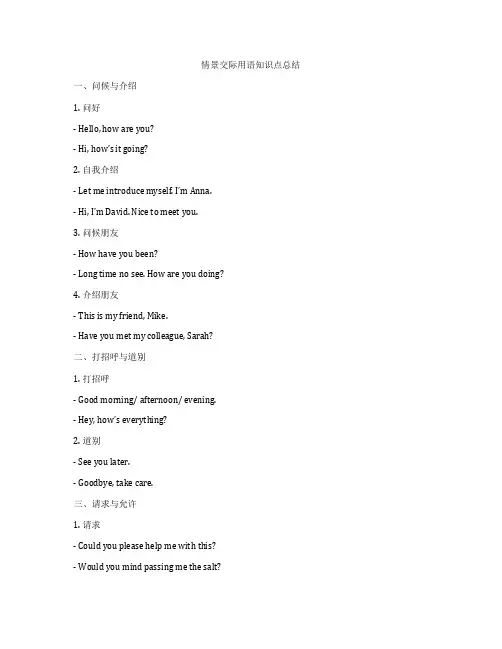
情景交际用语知识点总结一、问候与介绍1. 问好- Hello, how are you?- Hi, how’s it going?2. 自我介绍- Let me introduce myself. I’m Anna.- Hi, I’m David. Nice to meet you.3. 问候朋友- How have you been?- Long time no see. How are you doing?4. 介绍朋友- This is my friend, Mike.- Have you met my colleague, Sarah?二、打招呼与道别1. 打招呼- Good morning/ afternoon/ evening.- Hey, how’s everything?2. 道别- See you later.- Goodbye, take care.三、请求与允许1. 请求- Could you please help me with this?- Would you mind passing me the salt?2. 允许- Sure, no problem.- Of course, go ahead.四、感谢与回应1. 表示感谢- Thank you so much for your help. - I really appreciate it.2. 回应- You’re welcome.- No problem, glad to help.五、表达喜欢与不喜欢1. 喜欢- I really like this restaurant.- I’m a big fan of jazz music.2. 不喜欢- I don’t care for spicy food.- I’m not too keen on horror movies.六、表达赞同与不赞同1. 赞同- I totally agree with you.- That’s a great idea.2. 不赞同- I’m not sure I agree with that.- I’m afraid I have to disagree.七、请求和提供帮助1. 请求帮助- Could you please help me carry this?- Can you give me a hand with this?2. 提供帮助- Let me help you with that.- Do you need any assistance?八、询问与解释1. 询问- Could you tell me how to get to the nearest bank? - Do you know where the restroom is?2. 解释- That’s a long story, let me explain.- Let me clarify what I meant.九、道歉与原谅1. 道歉- I’m really sorry for being late.- Please forgive me for my mistake.2. 原谅- It’s okay, don’t worry about it.- I forgive you, no hard feelings.十、讨论和商议1. 讨论- Let’s discuss the details of the projec t.- I’d like to talk about our plans for next week.2. 商议- Let’s negotiate a better deal.- Can we come to an agreement on this issue?十一、祝福与祝愿1. 祝福- Best wishes on your birthday.- Good luck with your new job.2. 祝愿- I hope you have a great time at the party.- I wish you all the best in your future endeavors.。
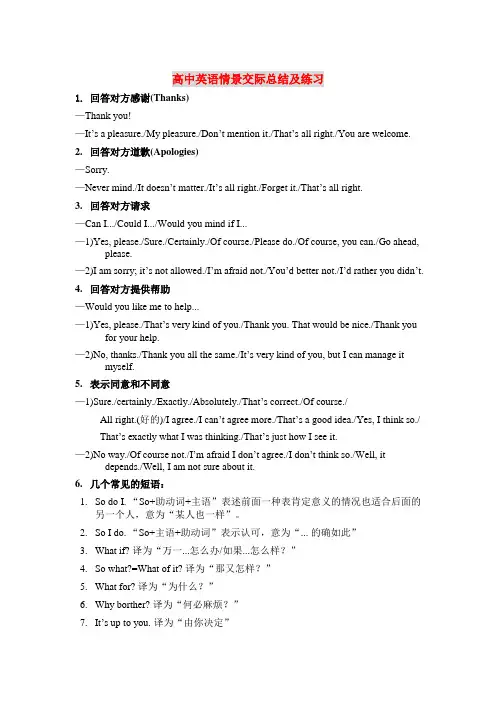
高中英语情景交际总结及练习1.回答对方感谢(Thanks)—Thank you!—It’s a pleasure./My pleasure./Don’t mention it./That’s all right./You are welcome. 2.回答对方道歉(Apologies)—Sorry.—Never mind./It doesn’t matter./It’s all right./Forget it./That’s all right.3.回答对方请求—Can I.../Could I.../Would you mind if I...—1)Yes, please./Sure./Certainly./Of course./Please do./Of course, you can./Go ahead, please.—2)I am sorry; it’s not allowed./I’m afraid not./You’d better not./I’d rather you didn’t.4.回答对方提供帮助—Would you like me to help...—1)Yes, please./That’s very kind of you./Thank you. That would be nice./Thank you for your help.—2)No, thanks./Thank you all the same./It’s very kind of you, but I can manage it myself.5.表示同意和不同意—1)Sure./certainly./Exactly./Absolutely./That’s correct./Of course./All right.(好的)/I agree./I can’t agree more./That’s a good idea./Yes, I think so./ That’s exactly what I was thinking./That’s just how I see it.—2)No way./Of course not./I’m afraid I don’t agree./I don’t think so./Well, it depends./Well, I am not sure about it.6.几个常见的短语:1.So do I. “So+助动词+主语”表述前面一种表肯定意义的情况也适合后面的另一个人,意为“某人也一样”。
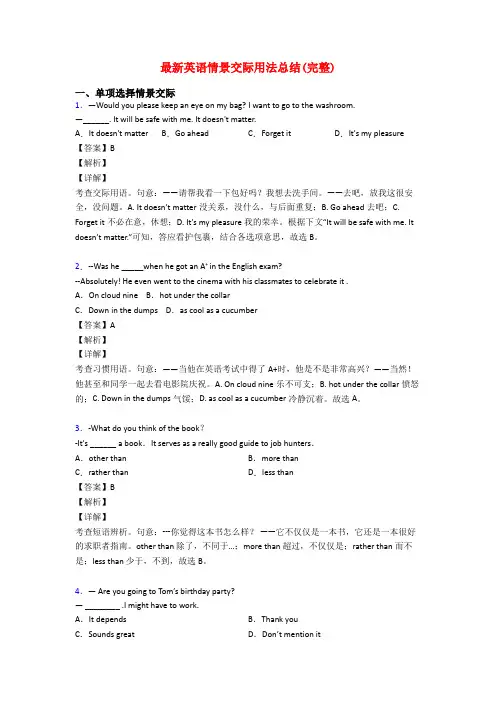
最新英语情景交际用法总结(完整)一、单项选择情景交际1.—Would you please keep an eye on my bag? I want to go to the washroom.—______. It will be safe with me. It doesn't matter.A.It doesn't matter B.Go ahead C.Forget it D.It's my pleasure 【答案】B【解析】【详解】考查交际用语。
句意:——请帮我看一下包好吗?我想去洗手间。
——去吧,放我这很安全,没问题。
A. It doesn’t matter没关系,没什么,与后面重复;B. Go ahead去吧;C. Forget it不必在意,休想;D. It’s my pleasure我的荣幸。
根据下文“It will be safe with me. It doesn’t matter.”可知,答应看护包裹,结合各选项意思,故选B。
2.--Was he _____when he got an A+ in the English exam?--Absolutely! He even went to the cinema with his classmates to celebrate it .A.On cloud nine B.hot under the collarC.Down in the dumps D.as cool as a cucumber【答案】A【解析】【详解】考查习惯用语。
句意:——当他在英语考试中得了A+时,他是不是非常高兴?——当然!他甚至和同学一起去看电影院庆祝。
A. On cloud nine乐不可支;B. hot under the collar愤怒的;C. Down in the dumps气馁;D. as cool as a cucumber冷静沉着。
高中英语情景交际总结及练习1.回答对方感谢(Thanks)—Thank you!—It’s a pleasure./My pleasure./Don’t mention it./That’s all right./You are welcome. 2.回答对方道歉(Apologies)—Sorry.—Never mind./It doesn’t matter./It’s all right./Forget it./That’s all right.3.回答对方请求—Can I.../Could I.../Would you mind if I...—1)Yes, please./Sure./Certainly./Of course./Please do./Of course, you can./Go ahead, please.—2)I am sorry; it’s not allowed./I’m afraid not./You’d better not./I’d rather you didn’t.4.回答对方提供帮助—Would you like me to help...—1)Yes, please./That’s very kind of you./Thank you. That would be nice./Thank you for your help.—2)No, thanks./Thank you all the same./It’s very kind of you, but I can manage it myself.5.表示同意和不同意—1)Sure./certainly./Exactly./Absolutely./That’s correct./Of course./All right.(好的)/I agree./I can’t agree more./That’s a good idea./Yes, I think so./ That’s exactly what I was thinking./That’s just how I see it.—2)No way./Of course not./I’m afraid I don’t agree./I don’t think so./Well, it depends./Well, I am not sure about it.6.几个常见的短语:1.So do I. “So+助动词+主语”表述前面一种表肯定意义的情况也适合后面的另一个人,意为“某人也一样”。
【精品】英语语法情景交际归纳总结一、单项选择情景交际1.—No words are strong enough to express our heartfelt thanks for your assistance.—________.A.Take it easy B.With pleasure C.It’s my pleasure D.Never mind【答案】C【解析】【详解】考查情境交际用语。
句意:——对你的帮助,我无法用言语来表达我们衷心的感谢。
——别客气。
A. Take it easy别着急;B. With pleasure我很乐意;C. It’s my pleasure不客气;D. Never mind没有关系。
结合句意故选C。
2.—Hey, do remember we are going to Mr. Black’s office tomorrow.—Oh, I have almost forgotten, but_____.A.not really B.never mindC.no problem D.no doubt【答案】C【解析】【详解】考查习惯用语。
A. not really不见得;B. never mind没关系;C. no problem没问题;D. no doubt毫无疑问。
句意:—嘿,别忘了我们明天要去布莱克先生的办公室。
—哦,我差点忘了,但是没问题。
故C选项正确。
3.We all think he is , who is not enthusiastic about anything we do.A.a black sheep B.a dark horse C.a green hand D.a wet blanket【答案】D【解析】【详解】考查习惯用法。
A. a black sheep害群之马; B. a dark horse黑马; C. a green hand新手;D. a wet blanket扫兴的人或物。
常有考点清单1. 问候 GreetingsGood morning/afternoon/evening. Hello/Hi.How are you?Fine, thank you, And you?Very well, thank you.I am fine,tooHow is?She is very well, thanksGood nightGood byeSee you tomorrow.See you laterJust so-so.Are you ?Yes,I am /No, I am not不,我不是。
2.介绍 IntroductionsWhat is your name? 清晨 / 下午 / 夜晚好!您好!你好吗?很好,感谢你呢?我也很好感谢。
我也很好。
. 好吗?她很好,感谢。
晚安。
再会.。
明日见。
待会见。
还行吧!你是吗?是,是我是。
/ 你叫什么名字?May I have your name please?能告我你的名字?My name is ⋯我的名字是⋯。
Just call me ⋯就叫我⋯ . 好啦。
What is your first/last name? 你的姓 / 名是什么?My first/last nameis ⋯. 我的姓 / 名是⋯How do you spell your name ? 怎么能拼写你的名字呢?Tom .T-O-M Tom .T-O-M 。
Who is the girl in white? 那个穿白色衣服的人是呢?What is your XXX ’s name ? 你 XXX的名字叫什么?His/Her name is ⋯他/ 她的名字是⋯。
This is Mr/Mrs/Miss/ ⋯⋯. 是⋯先生、女士、小姐Nice to meet you 很高到你。
Let me introduce ⋯我来介一下⋯。
I ’d like you to meet ⋯我想你见. 。
英语情景交际用法总结(完整)一、单项选择情景交际1.—How do you find the traditional food in Tianjin Ancient Culture Street? —_______.A.It's up to you B.Can't be better C.It was easy to find D.You got it【答案】B【解析】【详解】考查交际用语。
句意:——你觉得天津古文化街的传统食物怎么样?——再好不过了。
A. It's up to you这取决于你;B. Can't be better再好不过了;C. It was easy to find很容易找到;D. You got it你理解了。
How do you find sth./sb.?询问某人对某物/人的看法,译作“你认为……怎么样?”,B项“再好不过了”是评价。
故选B。
2.--Was he _____when he got an A+ in the English exam?--Absolutely! He even went to the cinema with his classmates to celebrate it .A.On cloud nine B.hot under the collarC.Down in the dumps D.as cool as a cucumber【答案】A【解析】【详解】考查习惯用语。
句意:——当他在英语考试中得了A+时,他是不是非常高兴?——当然!他甚至和同学一起去看电影院庆祝。
A. On cloud nine乐不可支;B. hot under the collar愤怒的;C. Down in the dumps气馁;D. as cool as a cucumber冷静沉着。
故选A。
3.—Wow! You look funny in that sweater.—My grandmother gave it to me for Christmas. You know,____________.A.each bird loves to hear himself sing B.beauty is in the eye of the beholderC.it is the thought that counts D.the outsider sees the most of the game【答案】C【解析】【详解】考查谚语。
高中英语情景交际总结及练习1.回答对方感谢(Thanks)—Thank you!—It’s a pleasure./My pleasure./Don’t mention it./That’s all right./You are welcome. 2.回答对方道歉(Apologies)—Sorry.—Never mind./It doesn’t matter./It’s all right./Forget it./That’s all right.3.回答对方请求—Can I.../Could I.../Would you mind if I...—1)Yes, please./Sure./Certainly./Of course./Please do./Of course, you can./Go ahead, please.—2)I am sorry; it’s not allowed./I’m afraid not./You’d better not./I’d rather you didn’t.4.回答对方提供帮助—Would you like me to help...—1)Yes, please./That’s very kind of you./Thank you. That would be nice./Thank you for your help.—2)No, thanks./Thank you all the same./It’s very kind of you, but I can manage it myself.5.表示同意和不同意—1)Sure./certainly./Exactly./Absolutely./That’s correct./Of course./All right.(好的)/I agree./I can’t agree more./That’s a good idea./Yes, I think so./ That’s exactly what I was thinking./That’s just how I see it.—2)No way./Of course not./I’m afraid I don’t agree./I don’t think so./Well, it depends./Well, I am not sure about it.6.几个常见的短语:1.So do I. “So+助动词+主语”表述前面一种表肯定意义的情况也适合后面的另一个人,意为“某人也一样”。